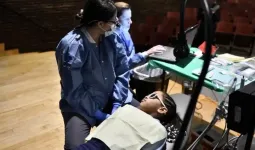Medical studies without adequate pre-publication review could damage public trust in science
Recommendations from three leading medical communication organizations aim to protect the integrity of published scientific and medical research
2021-04-01
(Press-News.org) The public could lose trust in science if scientific and medical researchers choose to bypass the traditional high standards of peer-reviewed medical journals in the rush to get research data released, particularly during crises such as the COVID-19 pandemic.
That's the warning from three leading medical communications organizations, that have published a joint statement in the peer-reviewed journal Current Medical Research and Opinion - asserting that the integrity of published scientific and medical research must be protected.
Out today, the joint statement from the American Medical Writers Association (AMWA), the European Medical Writers Association (EMWA), and the International Society for Medical Publication Professionals (ISMPP), argues that although peer-review is still the most common process for vetting scientific publications, there is a worrying trend for manuscripts to be released without pre-publication review.
Especially during the COVID-19 health crisis, medical researchers have felt significant pressure to publish COVID-19 findings as quickly as possible, but the statement emphasizes that having a pre-publication review is still essential. The danger is that once the threshold of publication oversight is lowered, it becomes a precedent that cannot be easily reversed, potentially eroding standards and causing the public to lose trust in medical science. "Medical communicators, including writers, editors, and those involved in quality control, play a critical role in ensuring that clinical and scientific data are published and disseminated in an accurate and clear manner. In the current rush-to-publish environment, all stakeholders in the scientific and clinical research communities and press must ensure that the public have correct and actionable information from which to make health and medical decisions," explained Gail Flores, PhD, President of AMWA.
In particular, the statement highlights the impact of preprints - preliminary scientific reports that are made publicly available online for anyone to read and discuss before they have been peer reviewed. While preprints enable rapid release and discussion of data, many are never revised or corrected, and only about a third-to-a half are ever fully published. This can also occur with articles submitted for post-publication peer review, in which an article is published in its original form, before expert peer reviewers are invited to critique it.
The statement recognizes the benefit of rapid publication but alerts that they have to be vetted against the potential harms associated with an accelerated process. "Particularly in these times, it is more important than ever to retain public trust in science, while balancing the need to report timely and relevant medical research," stated Beatrix Doerr, PhD, President of EMWA. In seeking a resolution, the three organizations present recommendations and a Reviewers' Checklist to provide a minimum standard of pre-publication vetting to enhance preprint publication processes.
Their key recommendations include:
Performing more extensive and consistent checks ? for example, by preprint server hosts ? - on articles that have not been peer-reviewed prior to publication.
Referencing preprints and articles uploaded for post-publication peer-review only as in-text reference (with a preprint link, DOI, or both), rather than as a bibliographic reference, and clearly labelled as a preprint, or as undergoing post-publication peer review.
Watermarking articles plus including a disclosure within the body of the article highlighting that the findings have not been formally peer-reviewed.
Educating medical journalists and the public about the differences between preprints, post-publication peer review, and traditional peer review.
Crucially, the organizations have also identified ways in which the peer-review process - renowned for being "laborious and time-consuming" - could be expedited. They call upon each stakeholder - authors, journal editors, and publishers - to play a part in this. Their key suggestions include:
Rapid response team of reviewers
Standardized formatting requirements to shorten the time to re-submission
Portable peer-review
Fast-track options
Incentives for reviewers
"For those engaged in preprints, post-publication peer-review, as well as traditional peer-review publications, our joint statement presents key practical recommendations to safeguard the quality of the publications while supporting their more rapid dissemination. We strongly encourage authors, journal editors, publishers, and other stakeholders to review and apply these practical suggestions, ensuring a high-quality standard for published research, irrespective of the format," emphasized Robert J. Matheis, PhD, MA, President and CEO of ISMPP.
INFORMATION:
ELSE PRESS RELEASES FROM THIS DATE:
2021-04-01
Review of 40 published studies from 17 countries offers first global assessment of the collateral impact of the COVID-19 pandemic on pregnancy outcomes.
Findings reveal overall increase in the chances of stillbirth and maternal death during the pandemic, but chances of pre-term birth decreased in high-income countries.
Women requiring surgery for ectopic pregnancies increased almost six-fold during the pandemic across all studies, after accounting for the size of included studies (surgery rate for ectopic pregnancies during pandemic 27/37 vs pre-pandemic 73/272), and symptoms of maternal depression were also increased.
Study reveals disproportionate impact ...
2021-04-01
The pandemic is affecting every country, but not every country has equal access to the lifesaving COVID-19 vaccines. Recent estimates show that high-income countries -- which have just one-fifth of the global adult population -- have purchased more than half of the world's total vaccine doses, resulting in disparities for low- and middle-income countries.
A new study by researchers at Virginia Commonwealth University investigates a key question: Will the U.S. population support donating part of its COVID-19 vaccine stockpile to less prosperous countries?
"COVID-19 is a true global pandemic that has touched every nation ...
2021-04-01
Houston Methodist has been a leader in successfully treating high-risk patients with monoclonal antibodies (mAB) for mild to moderate Covid-19 infection. Among the nation's largest providers of mAB therapy, Houston Methodist has infused nearly 4,000 patients since the FDA's Emergency Use Authorization (EUA) was issued. The hospital system was able to quickly ramp up its program once the EUA was granted by leveraging a number of resources through interdisciplinary collaboration.
As more hospitals begin to ramp up for treating Covid-19 with mAB therapy, Houston Methodist's example serves as a valuable model for other medical systems to establish or expand mAB treatment programs and improve patient access to this critical therapy. A commentary outlining the challenges, ...
2021-03-31
A team of University of Colorado School of Medicine researchers recently published a paper offering new insight into the role that oxygen deprivation, or hypoxia, plays in cancer development. CU Cancer Center member Joaquin Espinosa, PhD, is the senior researcher on the paper, which he hopes will help lead to more targeted treatments for cancer.
For their paper published this month in the journal Nature Communications, Espinosa and the rest of the team -- Zdenek Andrysik, PhD; Heather Bender, PhD; and Matthew Galbraith, PhD -- used state-of-the-art genomics technologies to map the response of cancer cells to hypoxia with unprecedented detail, ...
2021-03-31
Abusive alcohol drinking considerably impacts human health. Alcoholism, better defined as Alcohol Use Disorders (AUD), includes a group of pathological entities related to alcohol-induced damage. Individuals with AUD exhibit compulsive alcohol drinking and negative emotional states when alcohol drinking ceases. In the most severe AUD forms, the individuals lose control over consumption despite a decided will to stop. Some controversial issues have arisen as to whether the definition of AUD can help to delimit and characterize clinical entities related to abusive alcohol ingestion.
The World Health Organization (WHO) reports that approximately 3,3 million people (5,9% of global ...
2021-03-31
New findings from a Michigan Medicine study reveal that antibody testing is predictive of prior COVID-19 infection, and rapid screening methods - even from finger pricks - are effective testing tools.
Researchers analyzed antibody tests conducted on more than 500 subjects in patient care settings. They found that people who had COVID, including those with mild symptoms, produced antibodies.
"For a long time, people were very worried that people with mild COVID did not make immune responses," says Charles Schuler, M.D., a clinical assistant professor of allergy and immunology at Michigan Medicine. "This should give people confidence that the tests that are available to them aren't just random number generators. They're actually giving them ...
2021-03-31
New "sweat stickers" may streamline the early diagnosis of cystic fibrosis by enabling scientists to easily gather and analyze sweat from the skin of infants and children. The stickers matched the performance of previous, more cumbersome devices when tested with 51 subjects, suggesting the stickers could address design obstacles that have held back the diagnosis and treatment of cystic fibrosis in pediatric patients. Diagnosing cystic fibrosis in infancy or childhood is critical to achieve good outcomes, as current treatments must be given early to extend lifespans and alter the course of the disease. Many current diagnostics work by detecting levels of chloride in sweat, which are elevated in cystic fibrosis patients. However, these tests must often be repeated and use unwieldy wrist-wrapped ...
2021-03-31
For many parents, the COVID-19 pandemic has made life's everyday juggling act--managing work, school, extracurricular, and household responsibilities--much, much harder. And according to a new study led by Penn sociologists, those extra burdens have fallen disproportionately on mothers.
The research, shared in the April issue of the journal Gender and Society, investigated how shifts in work and school that arose due to the pandemic triggered changes in the division of labor in families. Using data on two-parent households from a nationwide survey conducted in April 2020, the researchers found that ...
2021-03-31
Scientists from the Skoltech Center for Energy Science and Technology (CEST) have developed a method for modeling the behavior of 2D materials under pressure. The research will help create pressure sensors based on silicene or other 2D materials. The paper was published in the ACS Nano journal.
Silicene, which is regarded as the silicon analog of graphene, is a two-dimensional allotrope of silicon. In its normal state, bulk silicon is a semiconductor with a diamond crystal type structure. As it thins down to one or several layers, its properties change dramatically. However, it has not yet been possible to study the change in the electronic properties of 2D materials at high pressure.
Scientists from Russia, Italy, the United ...
2021-03-31
In a longitudinal study published earlier this month in the Journal of the American Dental Association, researchers analyzed untreated decay in a cohort of nearly 7,000 children enrolled in the ForsythKids preventive dentistry program. Over the course of six years, the percentage of children with untreated cavities in the program decreased from 39 to 19 percent, suggesting that school-based prevention programs are effective in combating childhood dental disease.
Tooth decay is the most common chronic early childhood disease in the United States. More than half of children aged 6-8 years old have had a cavity, and kids from low-income families ...
LAST 30 PRESS RELEASES:
[Press-News.org] Medical studies without adequate pre-publication review could damage public trust in science
Recommendations from three leading medical communication organizations aim to protect the integrity of published scientific and medical research



